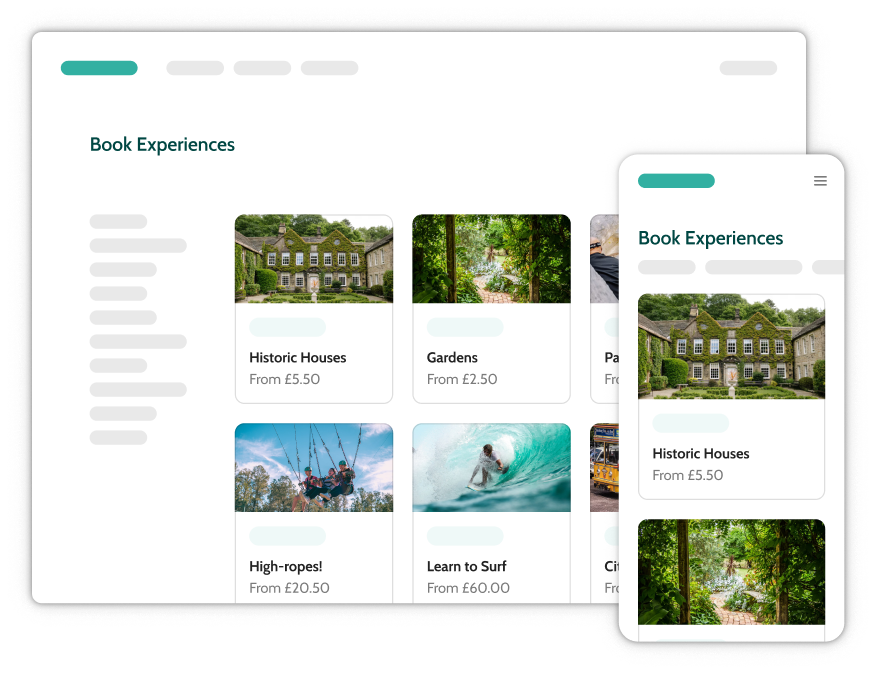
Things are taking a little longer than usual, please bear with us...
Surfing In UK
Read our guide for Surfing In UK and Find and Book experiences, courses, activities and tours! Browse through the list of experiences, either instantly book onto your dates or enquire to book. All you have to do is turn up and enjoy! If you’ve got any questions about any specific experience, send a message and the providers will aim to get back to you as soon as possible. Have a specific experience in mind that we don’t have listed? No problem, drop us a message and we’ll send your quote around to hundreds of the best experience providers nationwide and come back with you the best quote, making it easy for you to make the most of your spare time!
About Surfing
Surfing is a great sport for all to get involved with. Just being in the sea can be relaxing and invigorating, whilst experiencing the thrill of standing up and riding a wave is like no other! Feel the roaring power of nature beneath you, making you feel as if you’re flying, skimming across the sea. Even if you’re a beginner and manage to stand up for just a second, it’s a great feeling, one of thrill, excitement and accomplishment. With little kit or equipment needed, it’s an accessible sport to get involved with and a great way to get active.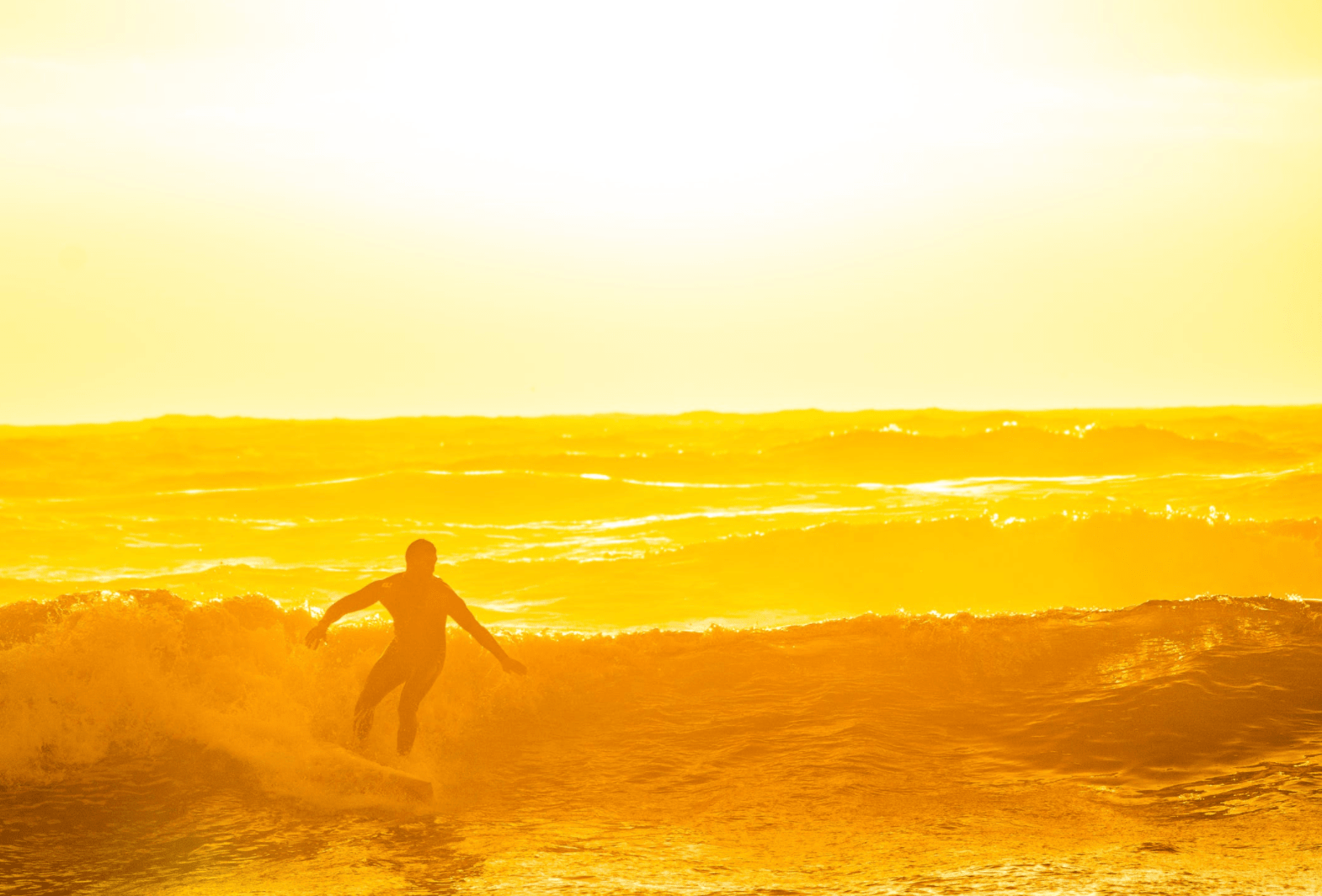
What are The Best Places For Surfing in UK?
Whilst surfing is possible on most coasts in the UK, it will often take a very special set of conditions to make it viable at many of these, so for the purpose of this I’m going to stick to 4 key areas:Surfing in Cornwall, North Coast
Surfing is pretty synonymous with Cornwall, with good reason. The north coast is the one exposed to the swells coming in from the Atlantic and has a huge number of great surf spots, with numerous great beach breaks alongside the few west-facing reefs in the country. From Sennen on the far west of the county to Bude near the border with Devon there is an almost continuous supply of surfable beaches, with workable options in nearly any conditions, with the sheltered north-facing coves often working well in stormy swells. Newquay is considered by many to be the home of British surfing and boasts several surf beaches. Fistral is a fantastic beach break though it can get very busy. When the surf is messy try Towan beach - tucked behind the harbour and a headland it is generally smaller than Fistral but can stay cleaner in a westerly. Sennen Beach is the furthest west of any beach in the country, and as the first point of contact with the land one of the most notable features is the incredibly clear and azure blue water. On a good day you’ll feel you’re in the Caribbean with the colour of both water and sand. Yours truly has also had the pleasure of surfing with dolphins here, so it will forever remain a personal favourite! Perranporth has another great and very extensive beach-break, meaning it’s easier to find some clear space when conditions are good. The Penhale end of the beach tends to get the best of the waves, and for those staying in the area it also has a great bar right on the beach to enjoy a rewarding drink or two afterwards and watch the sun go down!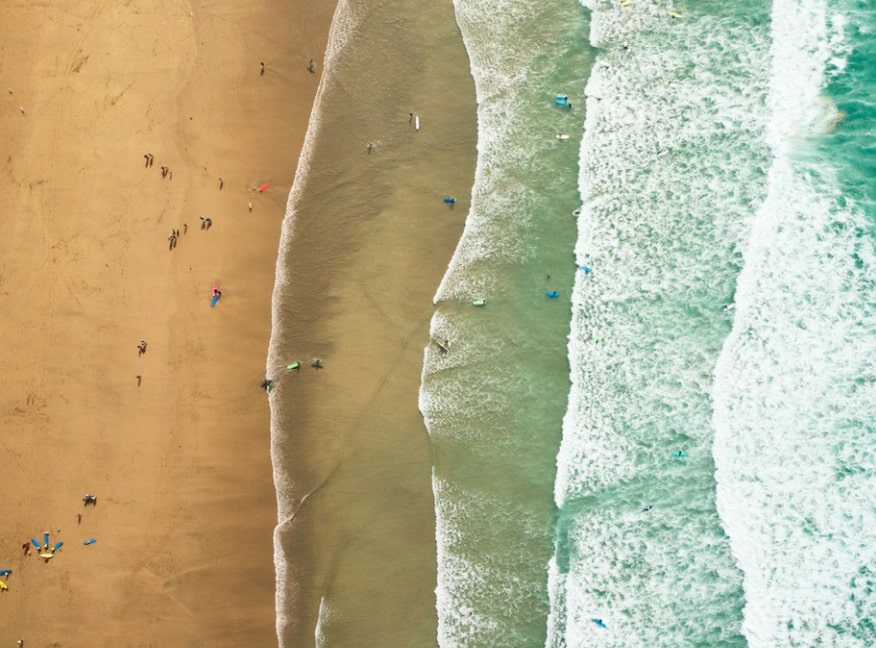
Surfing in Devon, North Coast
Perhaps as well known as a family holiday destination as a surf destination, Croyde has some of the best surf the UK has to offer. As a surf destination it works for most levels too. If the swell is too heavy or blown out with a westerly wind then head around Baggy Point to Putsborough Beach on the other side where it’s often a lot more sheltered and can produce some lovely clean lines when Croyde is blown out. Head round the other headland to the south and you have Saunton Sands with it’s seemingly endless beach, which produces a lovely long mellow wave very popular with longboarders.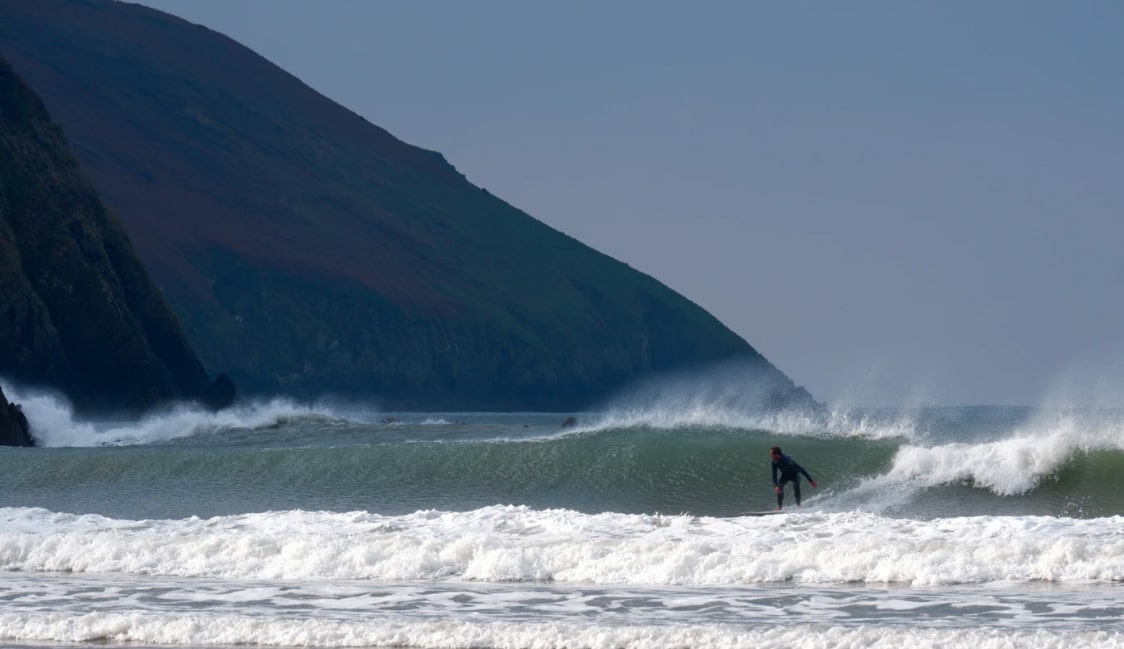
Surfing in South Wales & The Gower Peninsula
With such a stunning coastline we can’t miss out on South Wales and the Gower Peninsula! White Sands is one of the most reliable breaks here, located as it is at the tip of the south west coast close to St Davids. Further east the Gower Peninsula juts out nicely, allowing the stunning and lengthy Llangennith Beach to face due west and catch any good swells coming in. The Worm’s Head also makes for a magical setting to the whole experience.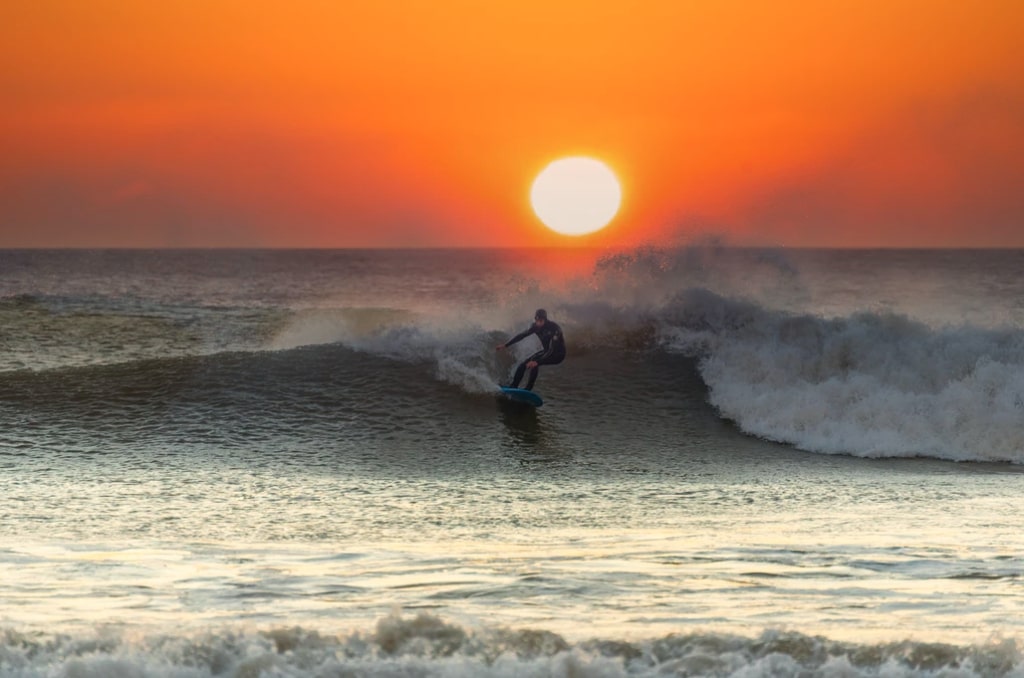
Surfing in North East of England
The stretch of coastline from around Scarborough up to Newcastle can bear the brunt of some brutal North Sea storms and swells, but these can often turn into some classic beach breaks, with some reefs that can produce some enviable barrels. There are surf schools at many of the prime locations such as Scarborough, with Saltburn being at the centre of the local surf scene, but a special note to Bamburgh in the north of Northumbria for some fantastic conditions which can be enjoyed with few crowds, plenty of seals, and with the famous castle as a backdrop. Watch out for currents though!Surfing in Scotland
The northerly tip of Scotland has some of the most consistent conditions in the UK, with Thurso being well-known on the international surf circuit. As you might expect the west coast is well exposed to the strong northern Atlantic swells, and in particular the west coast of Lewis in the Outer Hebrides receives some consistent and high quality waves.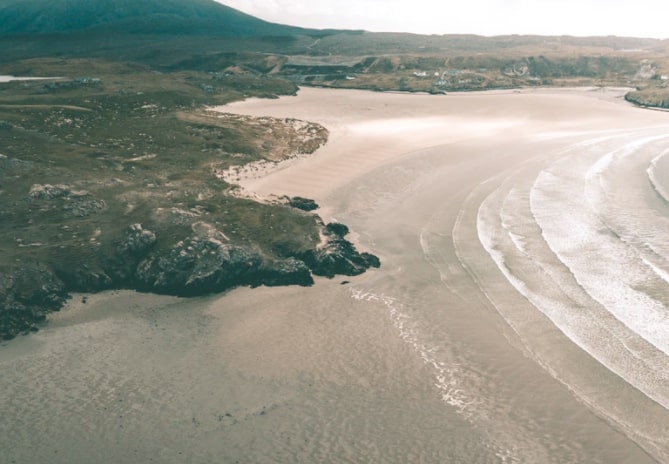
What Shall I Wear to Surfing?
Each surf school will provide a kit list, but most commonly (in the UK) you can rent or borrow a wetsuit and surfboard. You should bring along a swimming costume, towel, any spare change for the car park and snacks afterwards, warm clothes to change into afterwards, sun cream if it's a hot day and a rash vest or shirt to wear underneath your wetsuit to protect yourself from sand particles and rubbing on your skin. In the warmer months you won’t need anything other than a ‘summer’ wetsuit (2-3mm thick), but in the colder months you’ll want a ‘winter suit’ (4-5mm thick) as well as wetsuit boots, gloves and a hood too.How Do I Get Started in Surfing?
For your first few goes it’s best to get lessons from local surf schools, and there are often plenty of these around the more popular surf areas in the UK, especially along the north coasts of Cornwall and Devon, South Wales and the North East of England. You can find many of these on our website if you search for surfing. Once you’ve mastered the basics if you want to practice occasionally then hiring is still probably the best way to go, depending where you live and how often you can go! Surfing is very much a case of practice makes perfect, as so much depends not just on athleticism but the knowledge to read the waves, judge the take off point correctly, and if conditions are tough, strength in the arms and shoulders will play a big role too! So the more often you can get to the sea, the better you’ll get and the sooner you’ll get to a level where you can surf the clean waves! Until you’re proficient stick to beaches that have lifeguards present, as it can be an inherently dangerous sport, especially if the beach has currents you may not be aware of. If in doubt, always ask a local or ask the people in the surf school. It can be a nice social experience too, sitting out beyond the breaking waves waiting for the next set, so joining a club is a good idea if you’re keen to do as much as you can, and you’ll likely find a club no matter where you live.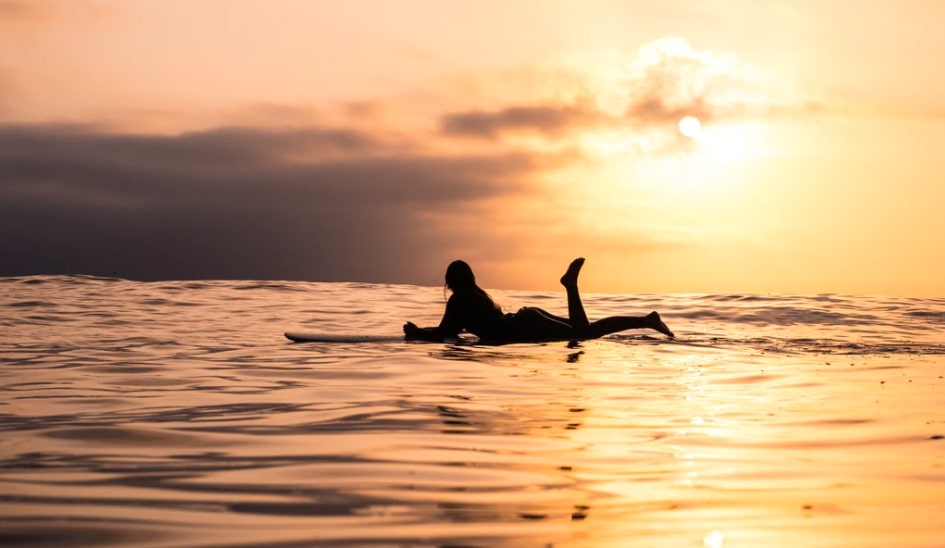
What Kit Do I Need for Surfing?
Whilst still hiring all you’ll need is swimwear for under the wetsuit. But once you decide to commit then it’s still a relatively inexpensive sport compared to many adventure sports. You’ll need a wetsuit for sure. Depending how frequently you think you’ll go, and when, there are options. In the summer you can stick to a 3/2mm suit as mentioned above, but if you feel the cold then at most other times of year you’ll want a 4/5mm suit (and bear in mind you might be sitting out on the water for a couple of hours or more). If you’re going to get just one suit, then a good 4/5mm suit is probably best - if you wear it in the summer and it’s too hot you can always splash water down the inside, and if it’s really hot then you may get away without one at all! You’ll also need boots, gloves and a hood from around November to May, depending on the outside temperature. A brand new board can set you back anywhere from £100 upwards, with beginner soft boards at the cheaper end. Beginner boards are soft to minimise any damage a harder board would make in rougher conditions, and they are also very buoyant, making them easier to stand up on. However they are much less maneuverable and slower on the wave too, so most will want to move on from them quickly once they have mastered getting up quickly and surfing ‘clean’ waves (ie, a wave which has yet to break, and still has a ‘face’ which you can surf along). After this what board you get will likely depend on what kind of wave you’re likely to spend most time on, and your surfing ability. Longer boards will range from 8-12 foot long, and will be less dynamic on the wave, but will allow you to get on slower and less steep waves, often meaning you get a really long ride. Shorter boards are extremely dynamic on the wave and can be used on steeper waves (often resulting in the ‘tubes’ you’ll often see surfers aspire to), but are generally harder to use and less forgiving. You’ll likely find out what sort of surfer you are and what you’re aspirations are once you get the bug in the early stages of lessons!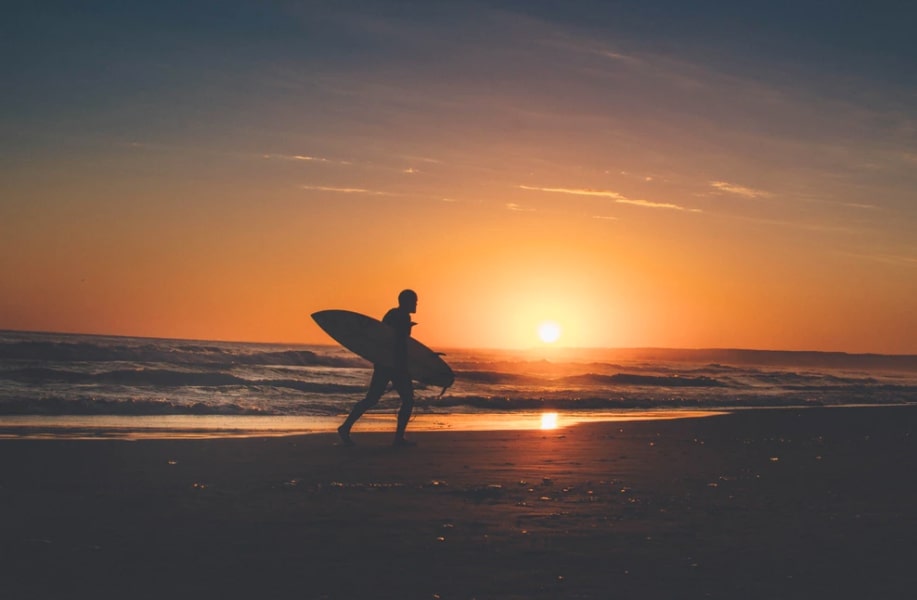
Who is Surfing Suitable For?
Surfing is suitable for almost anyone with a basic ability to swim (different centres have different requirements, but above 25 meters is normal) and who have some level of balance. Of course, as a beginner, it’s difficult to balance on the board but as you practice, some can find themselves standing up within a day. Surfing is suitable for all age-ranges often from 8 and above (which may require a parent to be present). Each surf school has different requirements.Other searches
Your journey to easier and more powerful ticket sales starts here
Quick sign-up, no obligations
Try for freeSolutions
Industries
© Copyright Beyonk Limited
Registration Number 11994212 (England and Wales)
